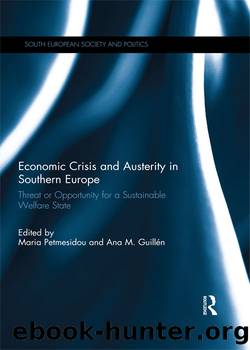Economic Crisis and Austerity in Southern Europe: Threat or Opportunity for a Sustainable Welfare State by Maria Petmesidou & Ana Marta Guillén

Author:Maria Petmesidou & Ana Marta Guillén [Petmesidou, Maria & Guillén, Ana Marta]
Language: eng
Format: epub
Tags: Political Science, General
ISBN: 9781138853553
Google: Bf_ZoQEACAAJ
Goodreads: 23318454
Publisher: Routledge
Published: 2015-01-15T08:22:12+00:00
Family and Care Policies before the Outbreak of the Crisis in Spain and Italy: A Fertile Land and a Quasi-Frozen Landscape
Since the 1990s limited new social rights relating to family and care issues have been established in Italy. Moreover, no relevant national plans to strengthen higher coverage rates have been put forward. Although some important legislative initiatives were produced, these usually fell short. Quite often, reforms lacked adequate financial resources in order to be implemented and to have a potential useful impact in the coverage of needs (Da Roit & Sabatinelli 2013; Kazepov 2010; Maino & Neri 2011). In particular, in the late 1990s to early 2000s four relevant acts were passed, but all of them showed shortcomings.
In 1997 a law on childrenâs welfare (law 285) promoted, among other interventions, care services, but only limited financial resources were provided for its implementation. The result has been the development of a variety of initiatives although neither their stability over time was ensured nor their capacity to deeply tackle care needs (Da Roit & Sabatinelli 2013). In 1999 a special family allowance for low income families with at least three underage children was established. However, the low level of benefits and the high threshold adopted were only able to address poverty intensity rather than reducing poverty (Da Roit & Sabatinelli 2013). In 2000 a law on parental leave was passed, introducing relevant innovation (the possibility to fraction flexibly the leave period, and the incentive for uptake by fathers). However, in this case there were also limitations in terms of relevance and coverage of care needs which this new piece of legislation offered (in particular in relation to duration and replacement rates) (Naldini & Saraceno 2008).
The most promising reform passed in those years was Law 328 in 2000. This legislation was relatively good in terms of principles and general aims. In particular, it stated the idea of national âbasic levels of social interventionâ (LEAs) to be guaranteed everywhere in different policy areas and for several types of intervention. However, these LEAs had two major shortcomings: they were vaguely defined, ending up not having any practical impact, and not enough resources were dedicated to implement them (in particular, no new mechanism was created in order to guarantee adequate funding for providing less residual social care and services). Moreover, the Constitutional reform in 2001 transferred more power to Regions and local authorities (but not more autonomous funding tools), leaving the state with more limited tasks.
The 2000s witnessed even less legislative production and also the development of a limited political debate about how to reform family policies. A centre-right government ruled for most of the decade (a centre-left government was in charge only for around one year and a half between 2006 and 2008). During its first five years of government (2001â06) the Berlusconi government intervened in family policies only in two ways in 2002â03. On the one hand, it lowered the threshold for entering kindergarten with bill no. 53. This legislation introduced the possibility for
Download
This site does not store any files on its server. We only index and link to content provided by other sites. Please contact the content providers to delete copyright contents if any and email us, we'll remove relevant links or contents immediately.
International Integration of the Brazilian Economy by Elias C. Grivoyannis(106934)
The Radium Girls by Kate Moore(12003)
Turbulence by E. J. Noyes(8008)
Nudge - Improving Decisions about Health, Wealth, and Happiness by Thaler Sunstein(7680)
The Black Swan by Nassim Nicholas Taleb(7090)
Rich Dad Poor Dad by Robert T. Kiyosaki(6579)
Pioneering Portfolio Management by David F. Swensen(6275)
Man-made Catastrophes and Risk Information Concealment by Dmitry Chernov & Didier Sornette(5981)
Zero to One by Peter Thiel(5768)
Secrecy World by Jake Bernstein(4727)
Millionaire: The Philanderer, Gambler, and Duelist Who Invented Modern Finance by Janet Gleeson(4448)
The Age of Surveillance Capitalism by Shoshana Zuboff(4267)
Skin in the Game by Nassim Nicholas Taleb(4224)
The Money Culture by Michael Lewis(4174)
Bullshit Jobs by David Graeber(4166)
Skin in the Game: Hidden Asymmetries in Daily Life by Nassim Nicholas Taleb(3977)
The Dhandho Investor by Mohnish Pabrai(3745)
The Wisdom of Finance by Mihir Desai(3721)
Blockchain Basics by Daniel Drescher(3566)
